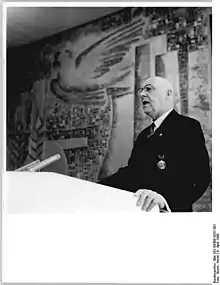Heinrich Homann
Heinrich Homann (6 March 1911 – 4 May 1994) was a communist politician and former Wehrmacht officer who held a number of offices in the German Democratic Republic.
Heinrich Homann | |
|---|---|
 | |
| Chairman of the National Democratic Party of Germany | |
| In office 1972 – December 1989 | |
| Preceded by | Lothar Bolz |
| Succeeded by | Günther Hartmann |
| Deputy Chairman of the State Council | |
| In office 12 September 1960 – 17 November 1989 | |
| Vice President of the Presidium of the People's Chamber | |
| In office 1950 – 1952 | |
| Member of the Volkskammer | |
| In office 1949 – 1990 | |
| Personal details | |
| Born | 6 March 1911 Bremerhaven, German Empire |
| Died | 4 May 1994 Berlin, Germany |
| Political party | |
| Alma mater | University of Tübingen University of Jena University of Göttingen University of Hamburg |
| Occupation | Politician |
| Military service | |
| Allegiance | |
| Branch/service | Heer |
| Years of service | 1934 – 1943 |
| Rank | Major |
| Conflict | World War II |
Biography

Heinrich Homann was born the son of a shipping company director in Bremerhaven in 1905. He studied law at the universities of Tübingen, Jena, Göttingen, and Hamburg. In 1933 he joined the Nazi Party and the following year entered the military. He eventually rose to the rank of Major in the Heer and fought on the Eastern Front in World War II. In 1943 he was taken prisoner by the Soviets at the Battle of Stalingrad. During his time as a prisoner of war, Homann became a member of the anti-Nazi National Committee for a Free Germany.
After the war, Homann returned to Soviet-occupied Germany and began his work in politics. He joined the National Democratic Party (NDPD), which largely represented former members of the Nazi Party and helped bind them to the state ideology of the German Democratic Republic.[1] He was first elected to the Volkskammer in 1949 and held his seat in the chamber for the remainder of his career. He became a Deputy Chairman in the State Council in 1960 and in 1972 he succeeded Lothar Bolz as Chairman of the NDPD. He was removed from the State Council in November of 1989 in the wake of the Peaceful Revolution and expelled from his party the following month.[2]
References
- Christina Morina (19 September 2011). Legacies of Stalingrad: Remembering the Eastern Front in Germany since 1945. Cambridge University Press. p. 99. ISBN 978-1-139-50170-5.
- Reuter, Elke; Müller-Enbergs, Helmut (2010). Wer war wer in der DDR? [Who was Who in the GDR?] (in German). Berlin: Ch. Links. ISBN 9783861535614.